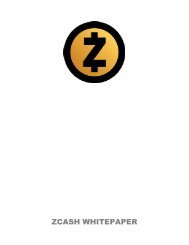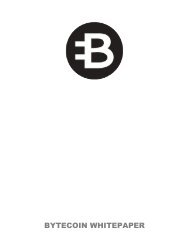Whitepaper - Ethereum Classic With Cover
Create successful ePaper yourself
Turn your PDF publications into a flip-book with our unique Google optimized e-Paper software.
<strong>Ethereum</strong> <strong>Classic</strong> Documentation, Release 0.1<br />
• Windows: C:\Users\username\%appdata%\Roaming\<strong>Ethereum</strong>\keystore<br />
• Linux: ~/.ethereum/keystore<br />
• Mac: ~/Library/<strong>Ethereum</strong>/keystore<br />
To backup your keyfiles (accounts), copy either the individual keyfiles within the keystore subdirectory or copy<br />
the entire keystore folder.<br />
To restore your keyfiles (accounts), copy the keyfiles back into the keystore subdirectory, where they were<br />
originally.<br />
Importing an unencrypted private key<br />
Importing an unencrypted private key is supported by geth<br />
geth account import /path/to/<br />
This command imports an unencrypted private key from the plain text file and creates a new account<br />
and prints the address. The keyfile is assumed to contain an unencrypted private key as canonical EC raw bytes<br />
encoded into hex. The account is saved in encrypted format, you are prompted for a passphrase. You must<br />
remember this passphrase to unlock your account in the future.<br />
An example where the data directory is specified. If the --datadir flag is not used, the new account will be<br />
created in the default data directory, i.e., the keyfile will be places in the keyfiles subdirectory of the data<br />
directory.<br />
$ geth --datadir /someOtherEthDataDir account import ./key.prv<br />
The new account will be encrypted with a passphrase.<br />
Please enter a passphrase now.<br />
Passphrase:<br />
Repeat Passphrase:<br />
Address: {7f444580bfef4b9bc7e14eb7fb2a029336b07c9d}<br />
For non-interactive use the passphrase can be specified with the --password flag:<br />
geth --password account import <br />
Note: Since you can directly copy your encrypted accounts to another <strong>Ethereum</strong> instance, this import/export<br />
mechanism is not needed when you transfer an account between nodes.<br />
Warning: When you copy keys into an existing node’s keystore, the order of accounts you are used to<br />
may change. Therefore you make sure you either do not rely on the account order or double-check and update<br />
the indexes used in your scripts.<br />
1.4 Ether<br />
1.4.1 What is ether?<br />
Ether is the name of the currency used within <strong>Ethereum</strong>. It is used to pay for computation within the EVM. This<br />
is done indirectly by purchasing gas for ether as explained in gas.<br />
Denominations<br />
<strong>Ethereum</strong> has a metric system of denominations used as units of Ether. Each denomination has its own unique<br />
name (some bear the family name of seminal figures playing a role in evolution of computer science and cryptoeconomics).<br />
The smallest denomination aka base unit of Ether is called Wei. Below is a list of the named<br />
1.4. Ether 53
















